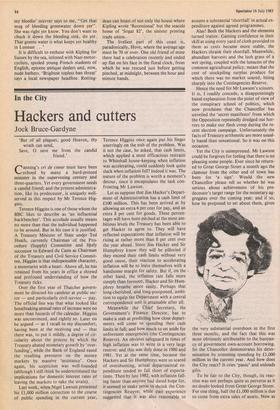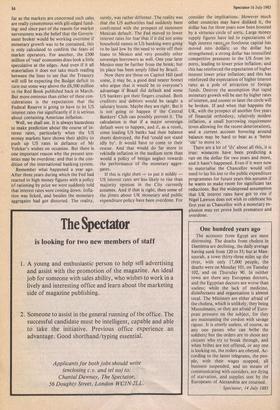In the City
Hackers and cutters
Jock Bruce-Gardyne
'But of all plagues, good Heaven, thy wrath can send, Save, 0 save me from the candid friend.'
anning's cri de coeur must have been N./echoed by many a hard-pressed minister in the supervening century and three-quarters. Yet every government needs a candid friend; and the present administra- tion, like its predecessor, is uniquely well- served in this respect by Mr Terence Hig- gins.
Terence Higgins is one of those whom the BBC likes to describe as 'an influential backbencher'. This accolade usually means no more than that the individual happened to be around. But in his case it is justified. A Treasury Minister of State under Ted Heath, currently Chairman of the Pro- cedure (Supply) Committee and likely successor to Edward du Cann as Chairman of the Treasury and Civil Service Commit- tee, Higgins is that indispensable character, a monetarist with a heart. Above all, he has retained from his years in office a shrewd and profound understanding of how the Treasury ticks.
Over the first year of Thatcher govern- ment he directed his candour at public sec- tor — and particularly civil service — pay. The official line was that what looked like breathtaking annual rates of increase were no more than hazards of the calendar. Higgins was unconvinced, and rightly so. Later on he argued — as I recall to my discomfort, having been at the receiving end — that there was, to put it mildly, a degree of cir- cularity about the process by which the Treasury abated monetary growth by 'over- funding', while the Bank of England eased the resulting pressures on the money markets by massive 'assistance'. Once again, his scepticism was well-founded (although I still think he underestimated the implications for domestic interest rates of leaving the markets to take the strain).
Last week, when Nigel Lawson presented his £1,000 million correction to the course of public spending in the current year, Terence Higgins once again put his finger unerringly on the nub of the problem. Was it not the case, he asked, that cash limits, which applied a most efficacious restraint to Whitehall house-keeping when inflation was accelerating, could suddenly look quite slack when inflation fell? Indeed it was. The nature of the problem is worth a moment's detour, since it encapsulates the task con- fronting Mr Lawson.
Let us suppose that Jim Hacker's Depart- ment of Administration has a cash limit of £100 million. This has been arrived at by allowing an extra 6 per cent for pay, and an extra 8 per cent for goods. These percen- tages will have been pitched at the most am- bitious levels the Treasury has been able to get Hacker to agree to. They will have reflected expectations that inflation will be rising at rather more than 8 per cent over the year ahead. Since Jim Hacker and Sir Humphrey know they will be pilloried if they exceed their cash limits without very good cause, their reaction to accelerating inflation will be to leave themselves with a handsome margin for safety. But if, on the other hand, the inflation rate falls more steeply than foreseen, Hacker and Sir Hum- phrey breathe more easily. Perhaps that long-cherished, and long-postponed, ambi- tion to equip the Department with a central correspondence unit is attainable after all.
Meanwhile the Chief Secretary, the Government's Finance Director, has to make a stab at predicting how close depart- ments will come to spending their cash limits in full; and how much to set aside for unforeseen emergencies (the Contingencies Reserve). An obvious safeguard in times of high inflation was to write in a very large reserve: and this was duly done in 1980 and 1981. Yet at the same time, because the Hackers and Sir Humphreys were so scared of overshooting, actual departmental ex- penditure tended to fall short of expecta- tions. Then by late 1982, with inflation fall- ing faster than anyone had dared hope for, it seemed to make sense to shrink the Con- tingencies Reserve; while past experience suggested that it was also reasonable to assume a substantial 'shortfall' in actual ex- penditure against agreed programmes.
Alas! Both the Hackers and the elements turned traitor. Gaining confidence in their skill at using every yard of cloth provided to them as costs became more stable, the Hackers shrank their shortfall. Meanwhile, abundant harvests and the lush grass of a wet spring, coupled with the lunacies of the common agricultural policy, meant that the cost of stockpiling surplus produce for which there was no market soared, biting sharply into the Contingencies Reserve.
Hence the need for Mr Lawson's scissors. It is, I readily concede, a disappointingly banal explanation from the point of view of the conspiracy school of politics, which now proclaims that the Chancellor has unveiled the 'secret manifesto' from which the Opposition repeatedly dredged out hor- rors to make our flesh creep during the re- cent election campaign. Unfortunately the facts of Treasury arithmetic are more usual- ly banal than sensational. So it was on this occasion.
Yet the City is unimpressed. Mr Lawson could be forgiven for feeling that there is no pleasing some people. Ever since he return- ed to Great George Street a month ago the clamour from the other end of town has been for 'a sign'. Would the new Chancellor please tell us whether he was serious about achievement of his pre- decessor's target range for the monetary ag- gregates over the coming year: and if so, how he proposed to set about them, given the very substantial overshoot in the first three months, and the fact that this was most obviously attributable to the buoyan- cy of government own-account borrowing. So the Chancellor demonstrates his deter- mination by trimming spending by £1,000 million in the current year. And how does the City react? It cries 'panic' and unloads gilts.
To be fair to the City, though, its reac- tion was not perhaps quite as perverse as it no doubt looked from Great George Street. For one thing, half the £1,000 million is due to come from extra sales of assets. Now as
far as the markets are concerned such sales are really synonymous with gilt-edged fund- ing: and since part of the reason for market nervousness was the belief that the Govern- ment broker would be working overtime if monetary growth was to be contained, this is only calculated to confirm the fears of market operators. For another, the £500 million of 'real' economies does look a little speculative at the edges. And even if it all materialises it does not take much reading between the lines to see that the Treasury will still be expecting the Budget deficit to turn out some way above the £8,500 million in the Red Book published back in March. But more ominous than either of these con- siderations is the expectation that the Federal Reserve is going to have to let US interest rates rise significantly if it is serious about containing American inflation.
Well, we shall see. It is always hazardous to make prediction about the course of in- terest rates, particularly when the US money markets have shown their ability to push up US rates in defiance of Mr Volcker's wishes on occasion. But there is one important reason why the present anx- ieties may be overdone: and that is the con- dition of the international banking system.
Remember what happened a year ago. After three years during which the Fed had reacted to high money figures with a policy of rationing by price we were suddenly told that interest rates were coming down. Infla- tion was licked, and besides the monetary aggregates had got distorted. The reality, surely, was rather different. The reality was that the US authorities had suddenly been confronted with the prospect of imminent Mexican default. The Fed moved to lower interest rates for fear that if it did not some household names in US banking were going to be laid low by the need to write off their loans to Mexico and very possibly other sovereign borrowers as well. One year later Mexico may be further from the brink; but its place has been amply filled by Brazil.
Now there are those on Capitol Hill (and some, it may be, a good deal nearer home) who argue that it would be to everyone's advantage if Brazil did default and some US bankers got their fingers crushed. Both creditors and debtors would be taught a salutary lesson. Maybe they are right. But it is not' going to happen if the Central Bankers' Club can possibly prevent it. The calculation is that if a major sovereign default were to happen, and if, as a result, some leading US banks had their balance sheets destroyed, the Fed 'could not stand idly by'. It would have to come to their rescue. And that would do far more to rekindle inflation in the medium term than would a policy of benign neglect towards the performance of the monetary aggre- gates.
If this is right then to put it mildly — US interest rates are less likely to rise than majority opinion in the City currently assumes. And if that is right, then some of the jitters about UK monetary and public expenditure policy have been overdone. For consider the implications. However much other countries may have disliked it, the dollar has for three years now been boosted by a virtuous circle of sorts. Large money supply figures have led to expectations of high interest ratesuo footloose capital has moved into dollars; so the dollar has strengthened; a strong dollar has intensified competitive pressures in the US from im- ports, leading to lower price inflation; and this has reinforced the expectation of higher interest lower price inflation; and this has reinforced the expectation of higher interest rates as a pole of attraction to foreign funds. Destroy the assumption that rapid monetary growth will be met by higher rates of interest, and sooner or later the circle will be broken. If and when that happens the UK, with the prospect of another five years of financial orthodoxy, relatively modest inflation, a small borrowing requirement (even allowing for the recent deterioration), and a current account hovering around balance may be hard to beat as a 'better 'ole' to move to.
There are a lot of 'ifs' about all this, it is true: wiseacres have been predicting a run on the dollar for two years and more, and it hasn't happened. Even if it were now to materialise the Chancellor would still need to lay his axe to the public expenditure programmes for future years this autumn if he wants to make room for significant tax reductions. But the widespread assumption that UK interest rates have got to rise if Nigel Lawson does not wish to celebrate his first year as Chancellor with a monetary ex- plosion may yet prove both premature and overdone.







































 Previous page
Previous page